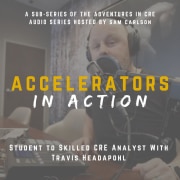Alternatives to Graduate Real Estate Education with Richard Byrd
Over the past few weeks, the Adventures in CRE staff have been updating and populating A.CRE with real estate education content, including profiles of some of the top undergraduate and graduate real estate programs in the United States. Though pursuing graduate education in real estate is a great option to further one’s career, it’s not completely plausible for every individual. Because of that, we put together an A.CRE Audio Series episode about alternatives to graduate education in real estate.
In this episode of the A.CRE Audio Series, we’re joined by Richard Byrd, a developer in commercial real estate and co-founder of the CRE analyst real estate training program. A huge thank you to Richard Byrd for sharing his knowledge in this episode with the A.CRE audience!
Alternatives to Graduate Real Estate Education with Richard Byrd
Watch as Spencer, Michael, and Richard Byrd, discuss education in real estate in general, as well as the alternatives to graduate education in real estate.
Or Listen to this Episode
Resources from this Episode
Episode Transcript – Alternatives to Graduate Real Estate Education
Announcer (00:01):
Welcome to The Adventures in CRE audio series. Join Michael Belasco and Spencer Burton as they pull back the curtain on everything commercial real estate, and introduce you to some of the top minds in the industry. If you want to take your skills to the next level and be part of a growing community of CRE professionals across the world, this is for you.
Spencer Burton (00:25):
Yeah. So Richard, great to have you here. For our audience members, Richard Byrd, he’s a developer in commercial real estate and is the co-founder of the CRE Analyst Real Estate Training Program. And the reason we brought Richard on, we’ve known each other for a while. There’s quite a bit of synergies between what CRE Analyst is doing and what we do here at A.CRE. And so, a question that we commonly get, and we think Richard is a great person to talk about this is, what is the next step in my career? So maybe you spent three, four, five, heck, maybe 10 or 15 years in the industry, and you reach a point where you’ve hit a ceiling. And how do you break through that ceiling? Do you need to pivot to another part of the industry? Do you need to go back to school? Do you need to enhance your skills?
Spencer Burton (01:15):
And so, that’s what we’re going to talk about today. It’s what are the alternatives in advanced real estate education that exist out there. And we’ll talk through those, be it MBA, Masters in Real Estate, technical programs like CRE Analysts, certificate programs that many universities put out there, or even a DIY approach to this. So maybe how we’ll start is, Richard, why don’t you introduce yourself and CRE Analyst for those who are unaware. And then, we can kick it off.
Richard Byrd (01:47):
Yeah, thanks for having me. Really exciting to join you all. And a little bit about myself, I’m a real estate developer by day and work in an opportunistic firm. We do a lot of different types of real estate, have bought an income-producing assets as well.
Richard Byrd (02:09):
But in a previous life, I was a teacher, did a program called Teach for America. And so, I’ve had this education bent in my background. And then about a year ago, joined up with a friend of mine who I’ve known really since I was teacher, 10 years ago, who had been teaching at the graduate and undergraduate level for 15 years. And put together a program to try to deliver them practical real estate skills that you need to be successful in the workplace. And so, we started that about a year ago, didn’t know exactly where it would go, but have had a ton of fun from teaching it. And we’re now in our fourth iteration of the class and continue growing it, going forward.
Richard Byrd (02:59):
So that’s a little bit about… We can talk more about that as it fits into options that some people might consider, depending on what their goals are.
Spencer Burton (03:08):
Yeah so, many of Richard students are accelerator members. Many of our accelerator members, or several have gone on to complete the CRE Analyst program. It is a very interesting relationship between what you’re teaching and what we do on the real estate financial modeling side. You also have an interesting background, having been a teacher and then transitioning into real estate. Talk to us about that moment where you decided that you wanted to pursue real estate. And many of those who are listening today might be at that point, where they’re may be now an entirely different industry. And they’re wanting to get into real estate, and they know that they need some additional skills. What did you personally do in order to position yourself to get a development job?
Richard Byrd (04:01):
Yeah so, the audience will know that we didn’t plan that question because my answer is somewhat unique. I didn’t master planet. So I was finishing teaching, I knew I wanted to be in the private sector. Frankly, didn’t know much about real estate. I grew up in, not a small town, but a town where it definitely was not a real estate town. I’m in Dallas now, which is absolutely a real estate town. I really didn’t know much about it as a career path. I was finishing teaching, thought I might want to transition into some sort of strategy consulting or something along those lines, and was just looking for a summer internship. I was going to teach a third year and literally, just fell into this job through a connection. I was cheap and unqualified. And so, I got into the business, helping some folks buy small self-storage properties. And just initially, it was like, hey, this is really cool. But then grew into really loving a lot of things about the industry.
Richard Byrd (05:02):
So I didn’t master planet. I think I had to backfill certain skills along the way, especially around modeling things that you all offer. I had to learn through a lot of pain and suffering, and Google searches and so forth. So I wasn’t able to master planet… by building up a skill set. I kind of got lucky and have just come to love the industry.
Spencer Burton (05:26):
Yeah. So you ended up getting an MBA… I’m sorry, Michael. Just really quick, I want to complete the story here. You went in and did an MBA. What precipitated an MBA when you already had a job in the industry? What was the point of that?
Richard Byrd (05:41):
Yeah, so I love to learn. So I’ve always wanted to learn and push, and I like being around other people who liked to learn. So the idea of pushing yourself to get a graduate degree, that always had some allure to me. I actually thought I might go after I finished teaching. And then, I fell into the real estate job, and then, things slowly evolved. I got into a point professionally where the opportunity costs of going to graduate school, which is really meaningful. Giving up either a year or two years out of the workforce, that’s a huge consideration that I think a lot of people overlook. That’s a long time. It got to the point from an income standpoint and a learning opportunity standpoint, that I couldn’t go back full time. So it was a luxury decision for me. I didn’t go to learn real estate. I went to somewhat of a passion to learn and push myself. But to learn some areas outside of what I do day to day, to backfill some accounting stuff, to backfill some statistics and things that were tangentially related to real estate.
Richard Byrd (06:48):
So that’s why I did it. Not necessarily to become better at real estate and as a vision towards trying to become more well-rounded to the future. With costs, I was able to do it part-time while working. So I didn’t have to give up the working, but the financial cost is significant.
Spencer Burton (07:05):
And what were the outcomes of that? So you went and got an MBA. And obviously, there’s a personal reason to learning it. Did you command more in the marketplace as a result? Are there additional job opportunities that were opened up to you, getting that to MBA?
Richard Byrd (07:26):
I couldn’t point to you and say, “Hey, for the substantial six figure plus some, you paid for this education, you’ve made that back within a few years.” I finished in August of 2018, so I haven’t been out too long. But what I look at as with a lot of networking, it’s long-term in nature. It’s very hard to quantify these things in the short term. But I look at people that I’ve met through graduate school. Am I doing deals with them now? Are they pulling big capital levers at firms to find developers or fund loans? No, not necessarily, but they’re on that track. So being younger, I can look 10, 20 years from now and say, “Hey, the value of the network will be there.” It wasn’t like I walked into an MBA program that was surrounded by people who are just had long, extensive track records of development and so forth. That’s not what you’re going to find.
Richard Byrd (08:23):
So taking the networking as one piece and a longer term piece in my mind. The education standpoint is, especially around topics like accounting or statistics or strategy, it’s really hard to kind of teach yourself. Even if you think you have the discipline, it’s hard to know what you don’t know and having somebody to push you and refine your thought process, there’s a lot of value in that. But once again, I think it depends on what you’re looking for. And it’s the cost from your time and your dollars.
Michael Belasco (09:03):
So you went to it through a passion for learning and not as a direct transition to elevate your career, per se, in terms of salary. Did you find though, that the education you got, and you said it rounded you out… was it actually applicable day one? Did you actually take what you were learning? And I really appreciate that you looked at the MBA… again, it was a passion for learning, not really a direct relation to, I need to elevate my career. If anything, it was probably that rounding out. So I’m curious how that played out, once you [crosstalk 00:09:35]-
Spencer Burton (09:34):
Yeah, it did. Yeah, that’s a good question. It did help, especially on some of the accounting side. But depending on what your role is and the business, understanding accounting’s not necessarily fundamental. But to me, it gave me this confidence that I wasn’t faking it. And there is some value in that to having the confidence in the workplace, that you don’t feel like you’re faking it. I don’t know that a Master’s is the best way to do that. It could be. But there is real value in becoming more confident in your skillset.
Michael Belasco (10:11):
Yeah so, it’s interesting the many different trajectories that go on. So to me, what I hear is your trajectory was really, you dove in, you were cheap and unqualified, which is an interesting position to be in when you first start your career. And it’s a spot that may be advantageous. And I’m curious to hear a little bit more about what you were doing to be cheap and unqualified to start. But I do want to call out the fact that it sounds like you really went through just the day-to-day… you worked up to your position today. And you stayed straight within the industry rather than taking a step out. A lot of people do that. We have so many different paths and trajectories, we all go on. So it’s really fascinating to hear that you actually just stuck through it.
Michael Belasco (10:53):
So real brief, I know it’s a little sidetrack, but this is pretty valuable for a lot of people who could be qualified or could classify as cheap and unqualified. And some things you could do to get into industry. So, I don’t know, totally putting you on the spot here. So I’m curious what that was, that was so cheap and unqualified that you got in the door and were able to leverage and move forward.
Spencer Burton (11:14):
Yeah. So a couple of things, one is, it’s not necessarily a credit. There were two things at play, one, market timing. So it was 2011, a lot of people had laid off, acquisitions programs who were picking up. It was like, “Hey, we think we’re doing intelligent things by going out and buying properties,” but there wasn’t a lot of certainty to it. So it was a timing thing for the firm I was at. They needed a little bit of help for the summer. And then, when there was a lot of momentum picked up, and I was there for the rebound, essentially, to step into that role. So from that way, it was kind of cheap and unqualified. But what I think over a longer term trajectory, what happened is, I kept working in the workplace and taking the next logical step. I encourage a lot of people to do that. I think we try to master plan things a lot of times. But if you have clear next steps, they make a lot of sense, just follow it, just take it. Even if you think your goal may be to go to grad school or get a Master’s or transition into development. From wherever you are, there’s always, I think almost always in my career, there’s been a clear, next thing I can gain, next thing I can learn. And just take that.
Spencer Burton (12:37):
And I think over time, things will become clear. It became clear for me that it was not…. if I was going to go to grad school ever, it was going to be in a part-time capacity for luxury reasons. But for other people it could play out that those next steps become really clear. That I’m in a dead-end, and there are no opportunities for me at this firm, therefore, I need to leave or pursue something different. So I think that I would just encourage people, take those clear next steps that are just laid out right there in front of you. I don’t know if you guys have seen similar.
Michael Belasco (13:10):
Yeah. Yeah.
Spencer Burton (13:11):
I used to try and master plan things, but they work out [inaudible 00:13:14] when you take the next step.
Michael Belasco (13:16):
It’s funny when you don’t see a next step, that’s somewhat of a sign. I won’t get into specifics, but in my own career path, I saw that I was putting a foot out and feeling, and there was nothing there. So I had to take a drastic leap, which was interesting. And if there isn’t that next step, maybe you do need to re-pivot or take a bigger risk or leverage educational opportunities, such as an MBA or something like CRE analyst. So…
Spencer Burton (13:45):
Well, let me stop Michael there, because he said he didn’t want to get personal. But Michael’s story is really interesting. And so, he pivoted from the construction side, the kind of mom and pop construction side of the business, to working for one of the largest, probably the most prestigious real estate development firm in the world. And he did that through a combination of a Master’s in Real Estate and a MBA. Michael, give us a little bit of like your mindset. Because Richard made a great point, which is there’s opportunity costs when you go, and you spent three years. There’s an enormous economic cost in terms of tuition and living expenses and whatnot. As you were thinking about, do you go back to school and commit that, do you blaze your own trail, do you do some hybrid of that, what went through your mind?
Michael Belasco (14:37):
Yeah, everybody’s story’s unique to themselves. Mine was a clear, definitive answer. I took three years out of the workforce, but like you said, I was in a mom and pop residential construction shop here in Philadelphia. And there was nothing else. I was managing projects and I wasn’t really advancing. And there was nowhere else to go. And just being in the construction industry, I always wanted to get on to the more institutional side. And so, it was more clear cut for me because there was talks of getting partnership interest in this company. But I didn’t see the company being long term. And so, that’s when I went back and started looking at the GMATs, and how could I transition? I had no network into the larger commercial real estate industry, zero at that time.
Michael Belasco (15:25):
And so for me, it was a no looking back. I went to GMATs, applied to a bunch of schools and the decision was, do I do a Master, do I do a MBA, or do I do both? And coming from where I was and knowing that my biggest value add to me that I recognize up front was financial modeling and getting the finance side down. Because I had the construction and project management side. That any extra time I could spend in school focusing and getting sharp in that area was worth it to me. Now, having the two pieces of paper that say, Master in Real Estate and MBA, helps my background because it was residential construction. So having those three is good.
Michael Belasco (16:05):
For somebody else, like Richard, who gets right into the industry and is doing underwriting deals, that path probably doesn’t make sense. So again, it’s very unique for everybody, but in my position, I don’t regret one minute taking three years out of the workforce. Because it elevated me to the position that I always hoped to be in. So that was a good track for me.
Spencer Burton (16:26):
Well, this is a good point. It’s probably the biggest takeaway thus far from our discussion. Network and credibility are incredibly important. And some of us already have a network. And therefore, maybe we don’t need to spend the money, either the opportunity cost or the actual economic cost, to expand that network when our network is sufficient to get us to the next place. And I fall somewhat in the same bucket as Michael. I did a Master’s in Real Estate because I had 12 years on the real estate side. And so, I didn’t really want to do an MBA at that point. I knew I was committed to real estate. But I was in a part of the industry, completely unrelated to where I wanted to be. And in order to gain the network and gain the credibility, it necessitated something more dramatic than a DIY approach to learning that new area.
Spencer Burton (17:18):
And even in your case, Richard, were you were, at least, already in the commercial side? And the SMU Network, which is a really strong real estate network, will benefit you long term. And so I think, on the Master’s in Real estate and MBA side… just conclude those two before we discuss the other alternatives. Its credibility in alumni in the network, I think, is the biggest value. And so, if you, listener viewer, are watching this and you’re trying to decide, you have to ask yourself, how is your network right now, how does your profile look in terms of credibility? And that will help decide whether the MBA or Master’s in Real Estate’s right. Or whether you don’t really need to spend the time and the money, and you can do alternative. Which the alternatives really are the skills that you need to be valuable to future investors or employees.
Spencer Burton (18:19):
Well so, let’s talk about some of those. Michael, maybe start with you. As you were learning certain things on your own, where did you turn? What are some ideas for how you can gain skills that will benefit employers or benefit investors?
Michael Belasco (18:38):
Yeah, as I said for me, my weak area was, it’s the genesis of adventure in this area, which was real estate financial modeling. So to me, it was, I had to go back to school. I didn’t even know where to look honestly. So when I went back, it was finding any financial model I could look at, getting those Thursday nights speaker series, where you’re just connecting in. And you get the crop circles of all the students and the speaker, and you’re just drilling questions. And if you’re lucky, you get to sit next to the guy, when you go out for a beer afterwards. For me, that’s really what I turned to. So anything I could soak up at school. And then, getting creative and finding ways to do projects when I could. Like, we found a defunct grocery store and Ithaca, New York, that I was lucky enough to just latch on as hard as I could, as strong as I could. And just follow along and get involved with like the repositioning of that. So any opportunity that I could find.
Michael Belasco (19:36):
There wasn’t really, at that time, external… it’s interesting because it brings up, his mind frame is always education and the skills. And so, all those things that, if you just need that, I don’t think existed, at least I wasn’t aware of at that time. So for me, there was me turning to grad school. There wasn’t CRE Analyst or the Accelerator or any of these programs, at least that I was aware of at that time. So I didn’t have any other resources that I was aware of.
Spencer Burton (20:08):
And so for you, Richard, before… And Michael’s right, there are a variety of, I’ve called them, technical programs now. And we haven’t even brought up certificates that universities provide. They’re kind of a hybrid, they’re an expensive technical option. But pre these technical learning options, how did you learn? You admittedly said, you had no experience. How did you figure this all out yourself?
Richard Byrd (20:42):
Yeah. I was somewhat fortunate to work for people who would slow down and explain things. I think that is a little bit unique in our business. Because our business is, there’s a lot of people driving hard, offices tend to run pretty lean, there’s not these big training programs where everybody sits down and walks you through what’s going on. So you really have to latch on to the people that are in the workplace that can teach you. Michael was in a role that he didn’t want to be in. I was in a role that I liked. I just wanted to get better at it. And so for me, the way to learn was either Googling stuff or leaning on people that were around me. Now, I think that game, it’s shifted. Information is more distributed. Like a program like y’alls, which is super high quality, a ton of our students leverage it to be better at their current jobs, get new jobs, et cetera. Those things weren’t out there. I would have loved to have had something like that 10 years ago, to lean into. The same reason you guys started it. Because I was looking for the same thing. I was looking for the models. I was looking for people who’ve been around the block, who will take the time to explain it to me, even if it’s outside of revenue production for my office that I’m in.
Richard Byrd (22:06):
So those things weren’t out there. So I was fortunate enough to have people around me that did take the time. And then, seeking out peers that did similar things and asking them to teach me things or share information with me was another method. But it was a little bit of, it wasn’t systemic, it wasn’t organized. And that’s frankly, somewhere to why you guys put together A.CRE. It’s why James and I decided to do CRE Analyst. It’s stuff that we wish we would have had. It would have saved us a lot of bludging to the head in the learning process.
Spencer Burton (22:44):
Yeah. That’s an interesting point. One of the series that we do at Adventures in CRE is called the Watch Me Build. And they’re one of the more popular, call them tutorials, whatever you want to call it. And the genesis of the Watch Me Build was… I’ve had, like you Richard, the pleasure and the great fortune to work with people who were great teachers as well. And one individual in particular, I loved to sit behind him and watch him model. And I’d see him do things, and I’d go, “How did he do that?” The alt tab, it’s a silly little thing, alt tab, where you switch between Windows and PC. And you can quickly move between ARGUS and Excel, just bam, bam, bam. I remember seeing him do that. I’m like, “How?” And so we created the Watch Me Build series because I love to sit behind someone and just learn from them.
Spencer Burton (23:42):
And I think very much, what y’all are at CRE Analyst has some of that elements. It’s more of a practitioners-focused training methodology. And that’s why I love what you guys are doing. Because it’s how I learned. Yeah, I went to grad school and I learned the academic. And really, the network and the credibility where a lot of the value came from my graduate experience. But in terms of the technical skills, the best way to learn it, is from someone who does it, who knows it.
Spencer Burton (24:14):
Talk to us now a little bit about why you and James started CRM Analyst. What’s the story behind that, that precipitated launching the program? And then we can get into a little bit about what the program’s all about.
Richard Byrd (24:28):
Yeah. So James and I met when I was finishing up teaching. We’re actually involved with some education reform stuff here in Dallas. And so, we’ve always shared this passion for education. This was K-12 education stuff we were working on. And then as I got into the business, our conversation shifted more towards real estate. And just, we built a friendship, shared notes and talked industry. We were mentoring a couple of people. We like to connect people and pull them into the industry. And we were talking about, hey, we should formalize this in a way that… if we’re helping people try to break into this industry by giving them skill sets, a little exercises here and there, there’s a lot of people that could benefit from this, that can’t afford or are not interested in going to the traditional education paths. And so about a year ago… James had been teaching for 15 years, has a ton of great quality stuff. And we said, “Hey, how can we take this, condense it down, make it hyper practical and super high quality?
Richard Byrd (25:38):
That, I think, is one thing that you guys do really well. We try to do with our material is, try to make it very high quality. People tend to appreciate that, come back for that. And so, I think that we did it a year ago. We had a couple of people that were like, “Hey, I’ll do it because I know what you are going to teach, and those are things I want to learn.” But we have no idea if people have any interest in doing this on an ongoing basis. And so, it slowly just grew from there. And so it’s basically, our industry is very fragmented and siloed. And so, with James’ background, more institutional equity, larger check-size deals. And then my background, which is much more smaller deals, entrepreneurial, general partnership, we cover a lot of ground. Both in asset class and roles.
Richard Byrd (26:35):
And so, we pulled all that together to put together CRE Analyst. And said, “Hey, we want to keep this short. We want to keep eight to 10 weeks. And we want to make it very intense.” Because the only way to deliver the skill sets is to do it… I mean, there are certain skill sets you have to get to, and to squeeze those into 10 weeks, it has to be intense. And so, that’s ultimately what it’s become. We continue to evolve it, make it better, and try to keep amping up the quality.
Spencer Burton (27:09):
Yes. And in a way it’s an accelerated Master’s in Real Estate. But focusing on, really, the technical pieces that are important in the job. Taking the academic part out and focusing on the tech… I’m sure there’s plenty of academic too, don’t don’t get me wrong. What’s the mindset of a perspective CRE Analyst candidate? What makes them choose a CRE Analyst versus going out, learning on their own, or going back to school, or what have you?
Richard Byrd (27:41):
I think there’s a couple of different things. The primary one is just that… we said there’s two prerequisites for people that want to be in our class. One, you have to be committed to being in real estate long term. Because it’s intense. It’s a lot of time investment. The skills aren’t necessarily transferable to other industries. So you got to know you want to be in real estate long term. So that’s the first thing. And then you got to be hungry to learn. This is not something where you show up and listen for a few hours and walk away, and you’re all of a sudden better. We all know this. In the business, it’s about developing the skill sets. So it’s very much exercise focused. We show you something, you go do it. Much like your models, it’s like, “Hey, we show you how we build this, but you need to be doing it yourself.” That’s how you’re going to get better at it.
Richard Byrd (28:30):
Our class is very similar in that it takes the exercise in addition to some coaching along the way. And so, there’s about five different types of people that take our class. But the common thread is, they’re either in real estate or no 100% that’s where they want to spend their career. And they either don’t have the time or the money to go invest in more traditional forms of education. And then as it relates to other certificate programs, a lot of people come to us because they’ve been referred by other people that have been through the program and know the quality. Whereas they think a lot of the certificate programs are more built on the name of the school that’s putting it on, rather than word of mouth people who’ve been through the program.
Spencer Burton (29:22):
Yeah. So I think… and we’re low on time. So to wrap this up, as we’re thinking about alternatives to graduate degrees, CRE Analyst is an excellent option. Amongst, really, the technical options that exist out there, there are few, if any, that I am aware of, that are structured in the way that yours is. And Michael and you and I went through that, where in our time to learn the technical skills, it’s either on the job, learning from someone who’s willing and able to share, or it’s figuring out yourself. And all of us went that path. And the reason you started to CRE Analyst, the reason that we run a A.CRE is because there is a better way. There’s a more accelerated way. And for many people, it’s the right path. Parting words, Michael? Wrap it up for us here.
Michael Belasco (30:25):
Sure. Yeah. I think that CRE Analyst along with programs like the Accelerator, what’s really fascinating about these is that both, like you said, are current practitioners. There’s current practitioners teaching. If you really want to get on the learning aspect and really learn from people who are doing it currently, these are really great options now. To sum up, really, if networking and expanding that, and getting a jumpstart on your career is another important factor, then there are other options out there, like the MBA or the Master in Real Estate. But really getting the fundamental nuts and bolts, current industry standards, these types of options are a really great way to go. So [crosstalk 00:31:16]-
Richard Byrd (31:14):
One thing I would add is, I’m sure you guys see this, in the development world, it’s about making incremental bets to get where you’re trying to go. I think that that is a benefit that is out in the world now, be it through your program, something like ours, or a number of other things, that you can do. You can make these incremental bets rather than having to go all in. If you want to get the MBA or you want to get the Masters, those programs are going to be there. Can you get where you want to go by making incremental bets? Or if you aren’t 100% sure that where you’re going, you don’t have to go commit to a large purchase. So I like the idea of making incremental bets to help you get where you want to go, rather than having to go all in. Now, that’s a developer. I like measuring my risk out over time, rather than all at one time. But…
Spencer Burton (32:07):
Yeah, that’s a really good perspective. And they aren’t mutually exclusive either. I’m sure you have plenty of MBAs in your program just as we have. And so, they’re not mutually exclusive. But to your point, you can stack one on top of the other. And as you discover what you need in your career, you can add those. And I’m still learning and all of us are still learning every day.
Spencer Burton (32:33):
So anyway, Richard, thank you again for joining us. This has been fascinating. For those that are interested in learning more about CRE Analyst, we’ll include a link to your website in the description of this video and this podcast. And for all of our listeners and viewers out there, thank you for your time and happy modeling.
Frequently Asked Questions about Alternatives to Graduate Real Estate Education








